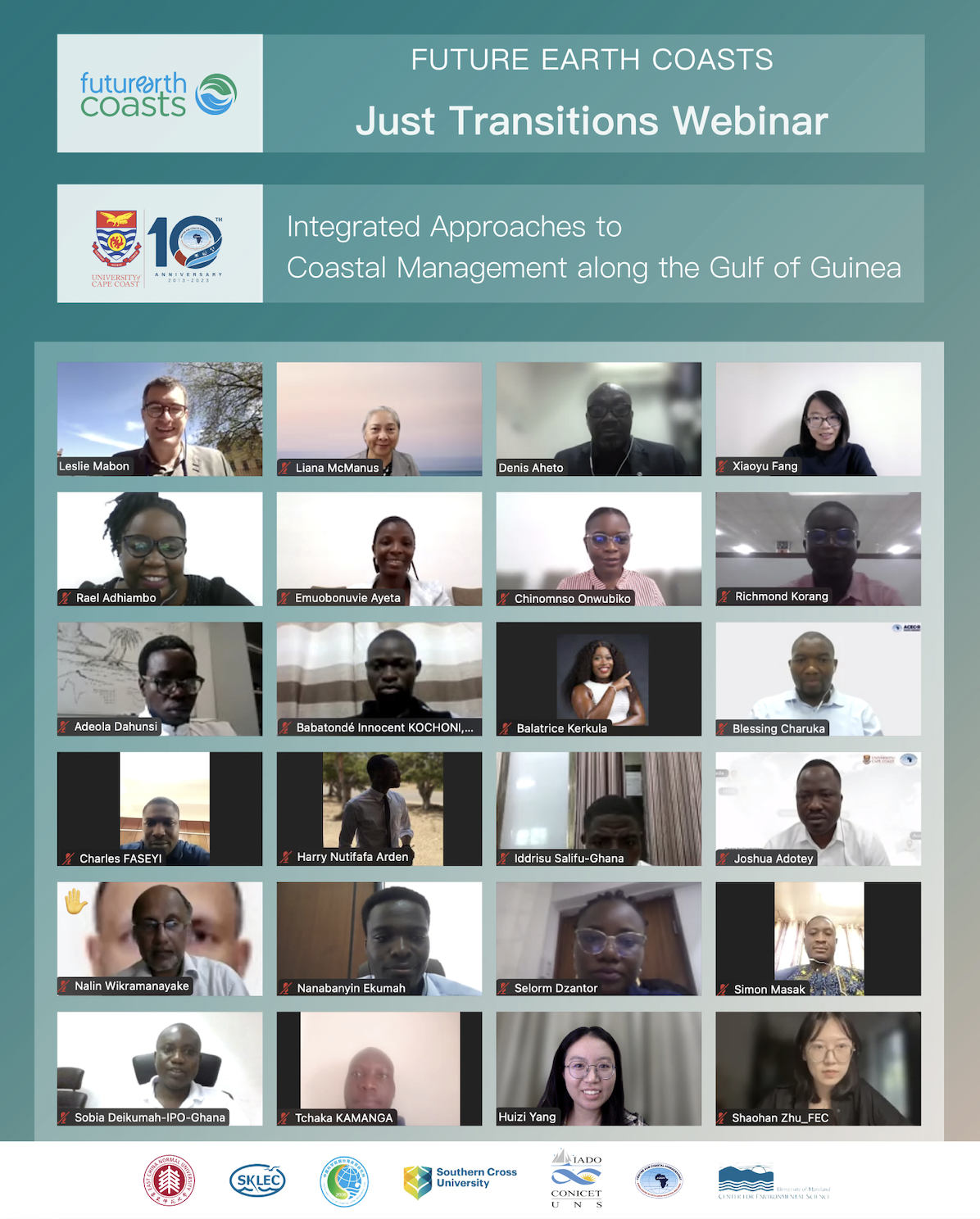FEC Webinar ‘Just Transitions: Integrated Approaches to Coastal Management along the Gulf of Guinea’ took place on 24 May. This event gathered up to 50 researchers globally. Speakers from FEC IPO Ghana provided insights into identifying and empowering vulnerable communities in coastal ecosystem restoration; ensuring sustainable livelihoods in small-scale coastal fisheries; developing new participatory governance models for coastal environmental management and decision-making; and characterising the under-representation of scientists from lower-latitude nations in global scientific research into aspects of the marine environment.
This workshop was moderated by FEC Fellow Dr. Leslie Mabon and FEC Academician Dr. Liana McManus. The event was graced by the esteemed presence of Prof. Dr. Dennis Aheto, a renowned scholar from ACECoR also the director of IPO Ghana, who delivered an enlightening keynote presentation. Drawing attention to the significance of impactful research and capacity building, Prof. Dr. Aheto emphasized the urgent need for a robust knowledge platform. He stressed the transformative power of students sharing ideas and learning from each other, fostering collaboration and resilience within the coastal and marine sphere.
In a captivating presentation, Dr. Rael Adhiambo, a Ph.D. candidate from ACECOR’s Department of Oceanography and Limnology, shed light on the critical gaps in phytoplankton research within Africa’s tropical regions. Her insightful analysis emphasized the urgent need for increased focus on this vital ecosystem component. Drawing attention to coastal communities’ vulnerability to floods, Chinomnso Onwubikoan, a Ph.D. student from the University of Cape Coast’s Department of Fisheries and Aquatic Science, introduced the innovative InVEST CV Model. Her study aims to enhance community resilience in the face of climate change and biodiversity loss, highlighting the invaluable role of mangroves. Her proposal encompasses climate financing, indigenous tree planting projects, and fostering awareness of the coastal ecosystem’s benefits. With groundwater quality under scrutiny, Emuobonuvie Ayeta, a Ph.D. student at ACECoR’s Integrated Coastal Zone Management, unveiled her profound study on Ghana’s coastal communities. Stressing the urgent need for groundwater protection, Ayeta emphasized the crucial role of capacity building in governance to safeguard this vital resource. Delving into the intricacies of small-scale fisheries, Richmond Korang, a researcher from the Centre for Coastal Management, University of Cape Coast, presented a thought-provoking case study of the Pra River Basin and the Akwidaa Community. His comprehensive analysis highlighted key drivers of change, emerging challenges, and policy considerations essential for ensuring the viability of small-scale fisheries across Ghana.
A dynamic discussion session unfolded after the presentations, bringing together participants to delve into the far-reaching impacts of climate change on coastal communities. The focus turned to the crucial role of shoreline responses in the face of rising sea levels, sparking thoughtful conversations on preserving mangroves and exploring nature-based solutions to mitigate disaster risks. Dr. Liana McManus shed light on a critical challenge faced by researchers from developing countries—publishing their valuable work in mainstream journals. Engaging with the issue head-on, Rael Adhiambo proposed a strategic approach, advocating for targeted research submissions and initiating conversations about affordability and accessibility. Dr. Liana McManus further underscored the promising potential of the Gulf of Guinea, with its budding experts and practitioners exhibiting unwavering dedication to tackling complex environmental issues.
The event served as a testament to the unwavering determination and visionary spirit of FEC scholars, who are at the forefront of addressing pressing coastal challenges. Their contributions exemplify the transformative power of collaborative dialogue and empower coastal communities worldwide to navigate a more secure and sustainable future.

